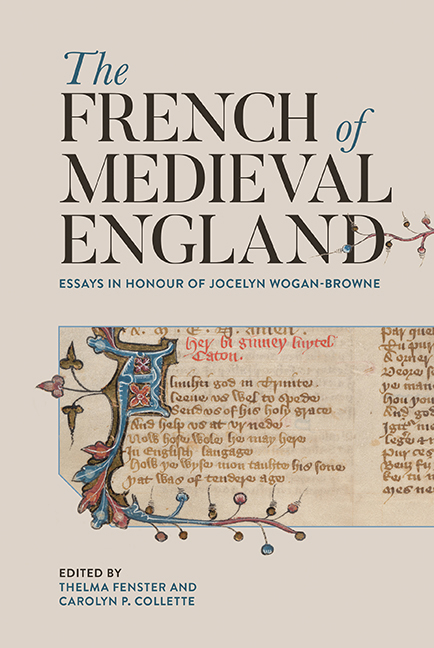Book contents
- Frontmatter
- Contents
- List of Illustrations
- List of Contributors
- List of Abbreviations
- Foreword: ‘The Light I Never Left Behind’: Jocelyn Wogan-Browne
- Introduction: Recognizing the French of Medieval England
- 1 The Gloss to Philippe de Thaon's Comput and the French of England's Beginnings
- 2 The Scandals of Medieval Translation: Thinking Difference in Francophone Texts and Manuscripts
- 3 Contrafacture and Translation: The Prisoner's Lament
- 4 Complaining about the King in French in Thomas Wright's Political Songs of England
- 5 The Chanson d’Aspremont in Bodmer 11 and Plantagenet Propaganda
- 6 The Use of Anglo-Norman in Day-to-Day Communication during the Anglo-Scottish Wars (1295–1314)
- 7 Middle English Borrowing from French: Nouns and Verbs of Interpersonal Cognition in the Early South English Legendary
- 8 William Langland Reads Robert Grosseteste
- 9 Disability Networks in the Campsey Manuscript
- 10 English Women and Their French Books: Teaching about the Jews in Medieval England
- 11 French Residents in England at the Start of the Hundred Years War: Learning English, Speaking English and Becoming English in 1346
- 12 French Immigrants and the French Language in Late-Medieval England
- 13 Fashioning a Useable Linguistic Past: The French of Medieval England and the Invention of a National Vernacular in Early Modern France
- 14 Admiring Ambivalence: on Paul Meyer's Anglo-Norman Scholarship
- 15 Twenty-First Century Gower: The Theology of Marriage in John Gower's Traitié and the Turn toward French
- 16 Royaumes sans frontières: The Place of England in the Long Twelfth Century
- Afterword
- Bibliography
- Index
- Publications of Jocelyn Wogan-Browne
- Tabula Gratulatoria
Afterword
Published online by Cambridge University Press: 12 August 2020
- Frontmatter
- Contents
- List of Illustrations
- List of Contributors
- List of Abbreviations
- Foreword: ‘The Light I Never Left Behind’: Jocelyn Wogan-Browne
- Introduction: Recognizing the French of Medieval England
- 1 The Gloss to Philippe de Thaon's Comput and the French of England's Beginnings
- 2 The Scandals of Medieval Translation: Thinking Difference in Francophone Texts and Manuscripts
- 3 Contrafacture and Translation: The Prisoner's Lament
- 4 Complaining about the King in French in Thomas Wright's Political Songs of England
- 5 The Chanson d’Aspremont in Bodmer 11 and Plantagenet Propaganda
- 6 The Use of Anglo-Norman in Day-to-Day Communication during the Anglo-Scottish Wars (1295–1314)
- 7 Middle English Borrowing from French: Nouns and Verbs of Interpersonal Cognition in the Early South English Legendary
- 8 William Langland Reads Robert Grosseteste
- 9 Disability Networks in the Campsey Manuscript
- 10 English Women and Their French Books: Teaching about the Jews in Medieval England
- 11 French Residents in England at the Start of the Hundred Years War: Learning English, Speaking English and Becoming English in 1346
- 12 French Immigrants and the French Language in Late-Medieval England
- 13 Fashioning a Useable Linguistic Past: The French of Medieval England and the Invention of a National Vernacular in Early Modern France
- 14 Admiring Ambivalence: on Paul Meyer's Anglo-Norman Scholarship
- 15 Twenty-First Century Gower: The Theology of Marriage in John Gower's Traitié and the Turn toward French
- 16 Royaumes sans frontières: The Place of England in the Long Twelfth Century
- Afterword
- Bibliography
- Index
- Publications of Jocelyn Wogan-Browne
- Tabula Gratulatoria
Summary
The essays in this collection celebrate both the extraordinary scholarly achievements and the intellectual inspiration that constitute Jocelyn Wogan-Browne's decades-long contribution to the study of what she has recently called ‘the sheer variety of registers and purposes served by French in Britain and medieval England’. By the concomitant variety of their approaches, the breadth and depth of their insights, and their individual and collective intent to expand the frontiers of our knowledge and understanding, the authors who have collaborated in this tribute provide an appropriate pendant to, and extension of, Jocelyn's own far-reaching and widely influential labors in this vineyard which, due to her industrious cultivation and to theirs, flourishes today as never before.
It is beyond the scope of this Afterword to attempt a summary of Jocelyn Wogan-Browne's accomplishments in expanding our knowledge and clarifying our understanding of the French of England (or Anglo-Norman, as it was almost universally called, pre-JWB), but a few stand out. One is certainly to have vigorously aligned the study of the French of England with current scholarly understanding that, as she herself put it, ‘moves away from the teleological model of language as a unitary entry bound into the development of the nation state’ and thus ‘moves us well beyond the notoriously contemptuous (and influential) treatment given insular French by nineteenth- and early twentieth-century scholars of French literature and makes it possible to dispense with the paradigm of English French as a unitary, degenerate, or static “mother-tongue” remnant’. By demonstrating – through new research and skeptical scrutiny of long-established generalizations about the ‘rise’ of English resulting in the ‘decline’ of French – some of the myriad ways in which Latin, French and English cohabited and interacted within the private, commercial and institutional spheres of later medieval English civilization, her work brings us to the point where ‘we can see instead a set of living registers of polyglot users’.
- Type
- Chapter
- Information
- The French of Medieval EnglandEssays in Honour of Jocelyn Wogan-Browne, pp. 280 - 290Publisher: Boydell & BrewerPrint publication year: 2017



